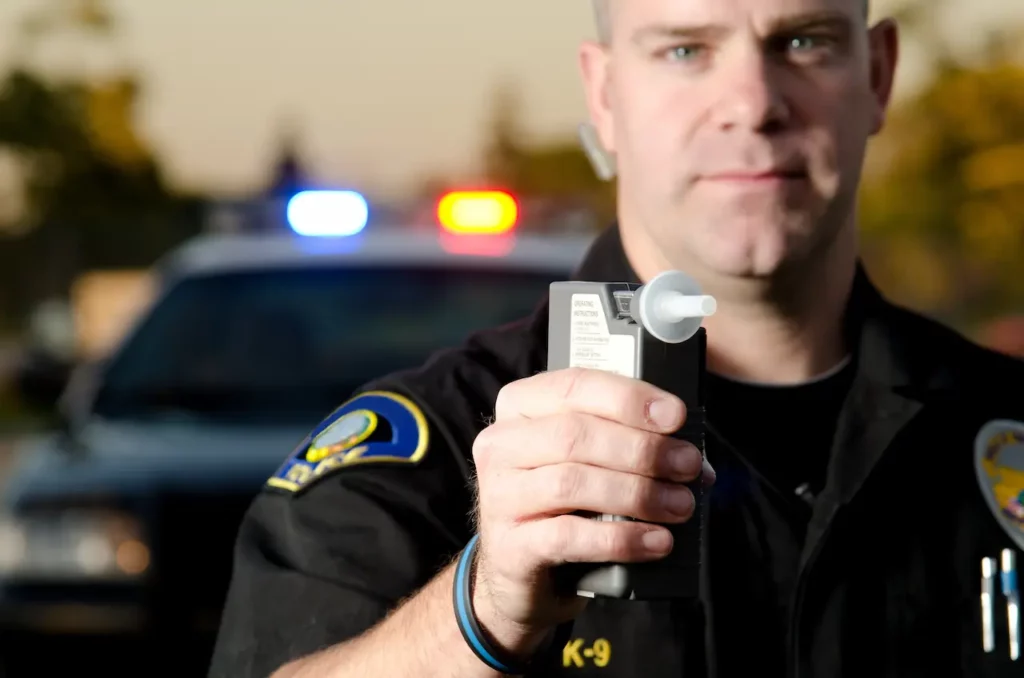
What Happens if I Refuse a Breathalyzer Test?
In the US, you have the right to refuse to take a breathalyzer test. However, if you're in a situation where you choose to refuse a breathalyzer test, it's important for you to be aware of your rights and to know the possible consequences as a result of your actions.
If you refuse to submit to a breath test to determine your sobriety, per the North Carolina DMV your license will be suspended immediately for 30 days. Learn about what else could happen when refusing a breathalyzer test in North Carolina.

Table of Contents
What Is a Breathalyzer Test?
A breathalyzer test is a commonly used device for measuring a person's blood alcohol concentration (BAC) by analyzing their breath. It is primarily employed by law enforcement agencies to determine whether an individual is operating a vehicle under the influence of alcohol.
To conduct a breathalyzer test, a person is asked to blow into a small handheld device, which then analyzes their breath sample. The device measures the amount of alcohol present in the breath and converts it into a BAC reading, typically displayed as a percentage. This numerical value is used to determine whether the person's BAC exceeds the legal limit for driving, which varies by jurisdiction but is generally set at 0.08% in many parts of the world.
Why Would Someone Refuse a Breathalyzer Test?
There are several reasons why someone might refuse a breathalyzer test when asked by law enforcement. One common motive is the concern about potentially incriminating oneself; if an individual believes they may be over the legal alcohol limit, they might refuse the test to avoid evidence that could lead to legal consequences.
Some people distrust the accuracy of breathalyzer devices, questioning their reliability and calibration. Others may refuse a breathalyzer test due to a lack of awareness or knowledge about the potential legal repercussions of refusal, while others may fear the immediate consequences of license suspension or administrative penalties for noncompliance. Ultimately, the decision to refuse a breathalyzer test can vary depending on an individual's circumstances, legal awareness, and personal considerations.
Implied Consent Laws
Driving a motor vehicle is a privilege, not a right. The Fifth Amendment Right against self-incrimination does not apply to a breathalyzer test. When the DMV issues and renews your license, you agree to these implied consent laws. The laws include showing your driver’s license and proof of insurance, consenting to a breathalyzer, blood, or urine test to determine your blood alcohol level, and performing field sobriety tests when requested by a law enforcement officer.
That means just by having your license and driving on North Carolina roads, you have consented to these things.
Refusing a Breathalyzer Test Can Still Lead to an Arrest
In addition to having your license suspended, if you refuse a breathalyzer test, it may still lead to your arrest. Your breath alcohol content test is just one piece of evidence the police officer collects in a suspected Driving While Impaired (DWI) case.
The police officer may give you a field sobriety test involving things like walking in a straight line with your finger on your nose and counting backward. They may also use the testimony of witnesses to determine if you were driving in an unsafe manner. You can be arrested even without breath, blood, or urine proof of your alcohol level if the law enforcement official determines you to be a danger to the public or yourself.
In fact, in most cases, if you refuse a breathalyzer test, it will result in an arrest.
Consequences if You Refuse a Breathalyzer Test in North Carolina?
If you refuse a breathalyzer test in North Carolina but are still arrested and taken in for booking because of the results of a field sobriety test or witness statements, the repercussions may look a bit different than if the arrest were based on the results of a breath test.
If you are charged with a DWI but did not take the breathalyzer, your license will immediately be revoked for 30 days, until your hearing, with a chance of limited driving privileges being instated after 10 days. Your DWI attorney can help you petition for these limited privileges.
Your car will also be impounded for 10 days, and you will need to pay for its release.
If you are convicted, your license will be revoked for a period of time depending on the number of offenses you already have. If it is your first offense, your license will be revoked for one year. For your second offense, it will be revoked for four years. To have your license reinstated after the end of this period, you will also have to complete the treatment assigned by the professional who conducts your substance abuse assessment. You may also have to pay fines and serve jail time, depending on the circumstances of your offense and which level you are convicted of.
If you aren’t convicted with a guilty verdict in court, you will still have your license revoked for a period of one year as a consequence if you refuse to take a breathalyzer test. You may be granted limited driving privileges, but only after six months without any license at all.
If you are preparing to go to court for a DWI charge and did not consent to a breathalyzer, an expert DWI attorney can help you understand the process and may be able to help you avoid a conviction.
Consequences for a DWI Conviction in North Carolina
If you are charged with a DWI, the consequences depend on the “level” of your conviction:
Level V
These are punishable by a maximum fine of $200 and a jail sentence of 24 hours minimum and 60 days maximum.
Level IV
Level IV DWI’s in North Carolina are punishable by a maximum fine of $500, and between 48 hours and 120 days in jail.
Level III
The fine for a Level III offense can be as high as $1,000, with the jail sentence being a maximum of six months, and a minimum of 72 hours.
Level II
Level II convictions are the second-most serious and can result in a $2,000 fine and between seven days and a year in jail.
Level I
At the most severe level, this can lead to a fine of up to $4,000 and between 30 days and 2 years in jail.
A DWI attorney can help you understand which Level your offense falls into, depending on grossly aggravating and aggravating factors. Level I and II offenses are those who have previous convictions, who are driving without a license, are transporting children, or are involved in an accident.
Final Word: What Happens if I Refuse a Breathalyzer Test?
The North Carolina Department of Motor Vehicles laws can be hard to understand in regard to DWI or suspected DWI cases. If you have been charged with a DWI or arrested, please contact one of our experienced North Carolina DWI attorneys for assistance.
Schedule your free 30-minute legal consultation with Van Camp, Meacham & Newman today.
Disclaimer: The information seen on this website, including the article above, is not legal advice or legal counsel. If you wish to speak to a criminal defense attorney, contact our North Carolina attorneys directly using our online form or by calling 910-295-2525. While our law firm is located in North Carolina, our attorneys have tried cases and work with clients across the country, from Raleigh, Fayetteville, Pinehurst, and Sanford, to Virginia, Illinois, Oregon, and California to Florida. Call our experienced attorneys today.

